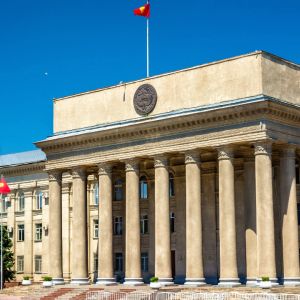Kyrgyzstan registers crypto transactions worth $7 billion
3 min read
The volume of crypto asset transactions in Kyrgyzstan has reached $7 billion, according to the head of the nation’s state-controlled investment agency. The official announced the figure at a meeting with the top U.S. representative in his country, during which cryptocurrency was among the main topics. The news comes after recent reports indicating the former Soviet Republic is being used by Russia to bypass war-related sanctions, including by trading through its crypto exchanges. Kyrgyzstan unveils total value of domestic crypto transactions The digital economy, and the crypto market in particular, was the focus of recent talks between the Director of Kyrgyzstan’s National Investments Agency (NIA), Farkhat Iminov, and the American Ambassador to Bishkek, Lesslie Viguerie, the local news outlet Knews reported. During the meeting, Iminov reminded the U.S. diplomat that the Kyrgyz Republic regulated its cryptocurrency sector in 2022, with the adoption of the law “On Virtual Assets.” By the end of 2024, the crypto turnover registered in the country amounted to $7 billion in value, highlighted the head of the state agency, which is subordinated directly to President Sadyr Zhaparov’s administration. Kyrgyzstan is considered a leader in Central Asia when it comes to the development of blockchain technologies, cryptocurrency mining, digital assets in general, and artificial intelligence (AI), the report pointed out. In that context, the U.S. ambassador noted in positive terms the introduction of the digital som, the central bank digital currency (CBDC) issued by the National Bank of the Kyrgyz Republic. Viguerie described its launch as one of the most innovative steps in the region, an indication of Kyrgyzstan’s desire for digital transformation. According to a press release, the two sides discussed current investment initiatives and prospective joint projects, with the American representative emphasizing the importance of Washington’s help in simplifying procedures related to doing business in the country. The Kyrgyz official remarked that his agency acts as an intermediary between businesses and state institutions, while signaling its readiness to assist U.S. and other partners in implementing investment projects in Kyrgyzstan. What about Kyrgyzstan’s role in Russia’s sanctions evasion? The formal statements during the meeting, quoted by the NIA’s press service, did not reveal whether Iminov and Viguerie discussed allegations that Russia has been using Kyrgyz crypto platforms to circumvent Western financial and trade restrictions. In a recently published report on the matter, the blockchain analytics firm TRM Labs said it had “identified a growing pattern of Russian actors exploiting the country to evade sanctions and procure dual-use goods for the war in Ukraine.” It elaborated: “Kyrgyz-registered exchanges have repeatedly facilitated transactions linked to sanctioned Russian entities. Many of these virtual asset service providers show indicators of being shell companies.” Some of these coin trading venues, TRM added, exert behavior similar to that of Garantex, the sanctioned Russian exchange which was taken down by U.S. law enforcement in March. Grinex, another high-risk exchange believed to have succeeded Garantex, was also registered in Kyrgyzstan. Mere weeks after Garantex went offline, Grinex started processing withdrawals with a Russian stablecoin called A7A5. According to an article by the Financial Times, the ruble-pegged digital currency has been used to transfer over $9 billion worth of assets in a period of four months. The stablecoin was launched, again in Kyrgyzstan, by Ilan Sor, a fugitive Moldovan oligarch. Its reserve assets were deposited at Promsvyazbank, one of Russia’s banks placed under sanctions by both the United States and the European Union. “On-chain analysis suggests that Grinex and other Kyrgyz-based exchanges may have played a role in moving funds after the takedown [of Garantex], underscoring Kyrgyzstan’s growing importance as a conduit for post-sanctions Russian financial activity,” TRM Labs noted. Cryptopolitan Academy: Coming Soon – A New Way to Earn Passive Income with DeFi in 2025. Learn More

Source: Cryptopolitan



